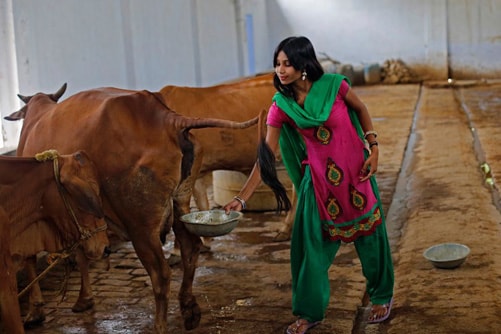Cow urine 'expensive as hot cakes' in India
Hindus used to believe that cows were sacred and that their urine had magical healing properties. Today, in India, the practice of consuming cow urine is being revived and has become a mainstream trend in the health care industry with many uses.
Holding a large basin, Susheela Kumari patiently hovers behind 24 cows on a farm in Bulandshahar, 80 kilometers east of New Delhi. She watches the animals’ rear ends, waiting for the slightest movement, like a wagging tail or a crouch in preparation to urinate.
Every day, Kumari and two other colleagues have to stand guard at the cow pen, collecting about 15-20 liters of urine from the animals. Kumari shared: "The most difficult task in our job is waiting to collect cow urine because you never know when the animal needs to pee. The boss does not want to waste any drop."
Susheela Kumari collects cow urine. |
Most farm workers rely on experience to determine when a cow will urinate. This requires patience and an understanding of each cow’s habits. A cow urine collector is paid 1,200 rupees a month.
Indian Prime Minister Narendra Modi has over the past two years issued policies to protect dairy animals such as goats and cows. The Mumbai government launched the Rashtriya Gokul Mission program in 2014 with a total investment of 87 million USD to build cow farms, prevent cattle from being illegally slaughtered and tighten measures against illegal cattle trafficking to neighboring Bangladesh.
Accordingly, instead of being sent to slaughterhouses, old cows that have run out of milk will be transferred to a separate farm to exploit urine. Part of the profit from selling cow urine will be used to build the farm and care for the cows. Currently, each liter of distilled cow urine is sold for 80-100 rupees (1.2-1.5 USD) in India, more expensive than cow milk (40-50 rupees).
The cow urine is poured into a purification vessel to remove impurities. The distillate is filtered, processed into powder or concentrated form and sold to manufacturers for traditional medicines. A team led by Dr. BA Golakia, head of the department of biotechnology at Junagadh Agricultural University, analyzed cow urine samples and found traces of gold and 388 substances of great medicinal value. About 30 medicines can be prepared from cow urine.
Cow urine is in high demand in India. One of the biggest buyers of cow urine in India is Baba Ramdev, founder of Patanjali Ayurveda Ltd. He pays 150,000 rupees a day to buy cow urine as an ingredient in soaps, detergents and herbal medicines. Patanjali's best-selling product is Gaunyle, a floor cleaner made from cow urine. The company produces 20 tonnes of Gaunyle floor cleaner every day, which is still not enough to meet the market demand. The company's products can compete with other major international brands such as Unilever or Colgate-Palmolive.
Virendar Kumar Jain, director of the Cow Urine Therapy clinic in Indore, which employs 15 experienced doctors, said his facility consumes 25,000 liters of cow urine every month and has used it as medicine for 1.2 million patients over the past two decades, treating everything from endocrine disorders to cancer. The facility receives 4,000 online orders every day from sites like Amazon.
However, some people believe that cow urine carries dangerous pathogens. Associate Professor Navneet Dhand, a specialist in biology and epidemiology at the University of Sydney, points out three diseases that humans can get from cow urine: leptospirosis, which causes liver and kidney dysfunction, and bacteria that cause arthritis, pneumonia, and heart attacks.
According to Baotintuc
| RELATED NEWS |
|---|


